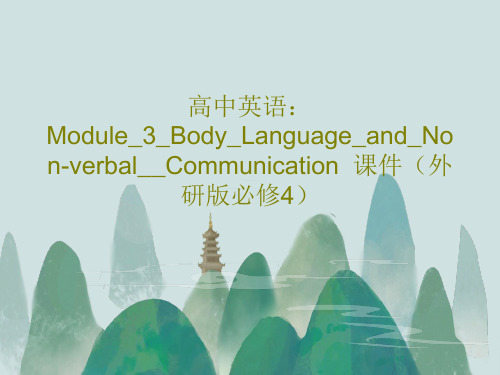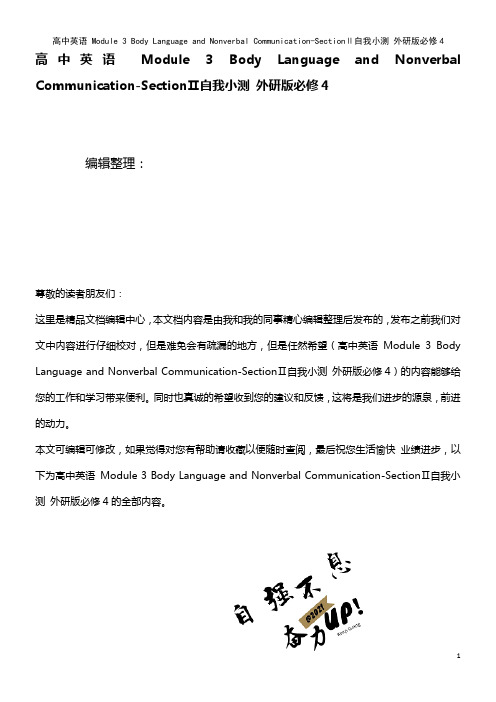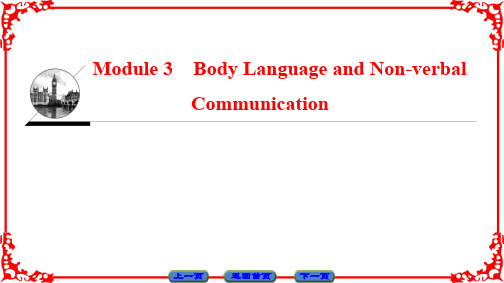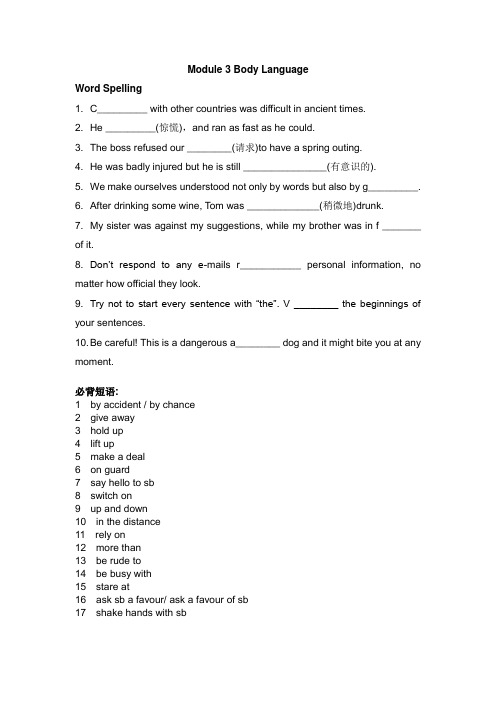grammer 3 body language
- 格式:ppt
- 大小:379.00 KB
- 文档页数:33


高中英语Module 3 Body Language and Nonverbal Communication-SectionⅡ自我小测外研版必修4编辑整理:尊敬的读者朋友们:这里是精品文档编辑中心,本文档内容是由我和我的同事精心编辑整理后发布的,发布之前我们对文中内容进行仔细校对,但是难免会有疏漏的地方,但是任然希望(高中英语Module 3 Body Language and Nonverbal Communication-SectionⅡ自我小测外研版必修4)的内容能够给您的工作和学习带来便利。
同时也真诚的希望收到您的建议和反馈,这将是我们进步的源泉,前进的动力。
本文可编辑可修改,如果觉得对您有帮助请收藏以便随时查阅,最后祝您生活愉快业绩进步,以下为高中英语Module 3 Body Language and Nonverbal Communication-SectionⅡ自我小测外研版必修4的全部内容。
Module 3 Body Language and Nonverbal Communication-SectionⅡⅠ.选出合适的连词完成句子1This is an illness that can result in total blindness ______(unless/if)left untreated.2—Why do you drink so much coffee?—Well,______(although/as long as)it doesn't keep me awake at night,I see no harm in it.3They may go swimming with us ______(because/provided)they arrive here in time。
4—______(if/unless)I visit every bookstore in town,I shall not know whether I can get what I want.—May you succeed。



Module 3 Body LanguageWord Spelling1. C_________ with other countries was difficult in ancient times.2. He _________(惊慌),and ran as fast as he could.3. The boss refused our ________(请求)to have a spring outing.4. He was badly injured but he is still _______________(有意识的).5. We make ourselves understood not only by words but also by g_________.6. After drinking some wine, Tom was _____________(稍微地)drunk.7. My sister was against my suggestions, while my brother was in f _______ of it.8. Don’t respond to any e-mails r___________ personal information, no matter how official they look.9. Try not to start every sentence with “the”. V ________ the beginnings of your sentences.10. Be careful! This is a dangerous a________ dog and it might bite you at any moment.必背短语:1 by accident / by chance2 give away3 hold up4 lift up5 make a deal6 on guard7 say hello to sb8 switch on9 up and down10 in the distance11 rely on12 more than13 be rude to14 be busy with15 stare at16 ask sb a favour/ ask a favour of sb17 shake hands with sb词类转换:1 communication n._______________ vi.2 unconscious adj. _______________( oppo )3 vary v. ___________n. ____________ adj4 traditionally adv _____________adj5 religion n. _________________ adj6 invitation n. ______________ v.7 performance n. ___________ v. _________ n.8 judgement n. _______________ v.9 social adj. ____________ adv . _________ n10 equality n. __________adj .____________adv.11 formal adj. __________(oppo)12 threaten v. __________n. __________adj.13 applaud v. __________n.词汇及语法练习单项填空1.If a person has not had enough sleep,his actions will give him ________ during the day.A.away B.up C.in D.back2.My sister was against my suggestion while my brother was ________ it.A.in favor of B.in memory ofC.in honor of D.in search of3.She ________ that no one be told of her decision until the next meeting.A.searched B.announcedC.requested D.questioned4.Try not to start every sentence with “the”—________the beginnings of your sentences.A.vary B.decorateC.form D.describe5.—I was conscious________ his unfriendliness.— Yes,I have known it already!A.for B.with C.at D.of6.The dog always remain ________,so many people are afraid of it.A.aggressive B.attentiveC.strong D.clever7.The chair was too weak to ________ Mr Smith.A.hold up B.hold onC.hold to D.hold off8. We're just trying to reach a point ________ both sides will sit down together and talk.A.where B.thatC.when D.which9. We can communicate _____ people in most parts of the world ______ telephone.A. to; withB. with; withC. towards; throughD. with; by10. Dark clouds are a _____ of rain while a smile is a ______ of friendship.A. sign; gestureB. gesture; signC. sign; mannerD. sight; sign11. I’m afraid I’m very busy ________the examination this week,so I can’t go and see you.A. prepareB. to prepare forC. preparing forD. prepare for答案Word Spelling1. Communication2. panicked3. request4.conscious5. gestures6. slightly7. favor8. requesting9. Vary10. aggressive单项填空1.A2. A3.C4. A5. D6. A7. A8. A9. D 10. C 11. C。

Module 3 Body Languageand Non-verbal munication身体语言会在不经意间表露一个人的心理,解读身体语言,请看下文……Body language is the quiet, secret and most powerfullanguage of all!It is said that our body movements municateabout 50 percent of what we really mean while words only express7 percent. So, while your mouth is closed, your body is justsaying...Arms. How you hold your arms shows how open and receptive you are to people you meet. If you keep your arms to the sides of your body or behind your back, this suggests you are not afraid of taking on whatever es your way. Outgoing people generally use their arms with big movements, while quieter people keep them close to their bodies. If someone upsets you, just cross your arms to show you’re unhappy!Head. When you want to appear confident, keep your head level. If you are a monitor in class, you can also take on this position when you want your words to be taken seriously. However, to be friendly in listening or speaking, you must move your head a little.Legs. Your legs tend to move around a lot more than normal when you are nervous or telling lies. If you are at interviews, try to keep them still!Posture(姿势). A good posture makes you feel better about yourself. If you are feeling down, you normally don’t sit straight,with your shoulders inwards. Thismakes breathing more difficult, which can make you feel nervous or unfortable.Mouth. When you are thinking, you often purse(撅起) your lips. You might also use this position to hold back an angry ment(评论) you don’t wish to show.However, it will probably still be noticed, and people will know you’re not pleased.Face. When you lie, you might put on a false face. But that expression would crack(破裂) briefly, allowing displays of true emotions such as happiness, sadness, disgust(厌恶) and fear to e through.Section ⅠIntroduction & Reading and Vocabulary—prehending重点单词写作词汇1.deal n.协议;交易2.involve vt. 包括3.spread vi.X开拓展词汇4.munication n.交流;沟通→municate vi.(用语言、信号)传递信息;交流5.unconscious adj.无意的;不知不觉的→conscious adj.意识到的;自觉的6.vary vi.变化→variety n.种类→various adj.各种各样的7.formal adj.正式的→informal adj.非正式的8.traditionally adv.传统地→traditional adj.传统的→tradition n.传统9.threatening adj.恐吓的;具有威胁的→threaten v.威胁→threat n.威胁10.slightly adv.轻微地;稍微→slight adj.轻微的;少量的阅读词汇11.aggressive adj.攻击的;挑斗的;挑衅的12.weapon n. 武器13.gesture n. 姿势;姿态14.forehead n. 前额15.bow vi.鞠躬16.youth n. 年轻人17.palm n. 手掌18.slap vt. 掌击重点短语1.on guard(保持)警惕2.make a deal达成协议;做成交易3.hold up举起4.give away暴露(自己的情况)5.shake hands with与……握手重点句型1.more than+名词:Although these are very important,we municate with more than just spoken and written words (不仅仅靠口语和书面语交流).2.介词+宾语从句:Indeed, body positions are part of what we call “body language”(我们所称其为“肢体语言”).3.独立主格:One person then holds up his hand, palm outwards and five fingers spread(掌心向外,五指X开).ⅠRead the text and match the main idea of each paragraph.1.Para.1 A.Greetings in Asian countries.2.Para.2 B.Ways of munication.3.Para.3 C.Fascinating body language.4.Para.4 D.Greetings in western countries.5.Para.5 E.American yo uths’ greeting today.答案:1-5.BDAECⅡRead the text carefully and choose the best answer according to the text.1.What is the best title of the text?A.When in Rome, Do as the Romans DoB.Greetings Around the WorldC.How to Shake HandsD.Nonverbal munication2.Which of the following statements is TRUE?A.Not all body language is conscious.B.Europeans shake hands with their left hands.C.At any time,we use “learned” body language.D.Ways of greeting are the same all over the world.3.Why do Europeans and Americans shake hands with their right hands?A.They have been used to it.B.The right hands are the weakest ones.C.They think it is formal.D.They want to express they trust each other.4.Which of the following belongs to one of the greetings in the US?A.Not to touch the other person.B.To put the right hand over the left.C.To greet each other with “give me five”.D.To join their hands.答案:1-4.DADCⅢAnalyze the following difficult sentences in the text.1.Indeed, body positions are part of what we call “body language”.[翻译] 实际上,身体的姿势是我们所称其为“肢体语言”的一部分。
2013-2014高中英语《Module3 Body Language》课中学案外研版必修4【归纳拓展】communicate…to…的争吵中His work involves occasional journeys._______________________be/get involved in…被卷入……之中;使专注于be/get involved with sb. 与某人混在一起be involved in doing sth. 专心做某事【活学活用】Putting in a new window will ________cutting away part of the roof.A. includeB. involveC. containD. comprise4.stare v _________Don't stare at me like that. ______________________________He sat there, staring into the space. 他坐在那儿,凝视着太空。
【巧辩异同】stare, look, see, watch, glare, observestare “盯着看,凝视”;眼神很集中look 只强调“看”的动作,不强调结果,可以用于进行时态。
see 强调“看见”的结果,不可以用于进行时watch “注视,观看”,指目光教集中地看电视、表演等glare “怒视”,相当于stare angrilyobserve 强调从不同的角度较长时间地“观察,研究”5. touch v. 触摸;感动She lightly touched his forehead. 她轻轻地摸了摸他的前额。
I was touched beyond words. 我莫名地感动了。
【归纳拓展】touch sb. on the head 触碰某人的头hit/strike/pat + sb. + in/on + the +身体部位take/ seize sb. + by the +身体部位【活学活用】Father __________________gently. 爸爸轻轻地拍了拍我的肩膀。
Module 3 Body Language and Non-verbal CommunicationPart One Teaching Design第一部分教学设计Period 1 Reading—Saying It Without Words■Goals●To learn to read passages with Adverbial clause of conditionand Adverbial clause of concession about body language●To learn to read with strategies■ProceduresStep 1: Warming up by defining Body LanguageBody language is a broad term for several forms of communication using body movements or gestures, instead of, or as a complement to, sounds, verbal language, or other forms of communication. In turn, it is one category of paralanguage, which describes all forms of human communication that are not language.Warming up by telling about your classmate’s body languageHi, class. Look at my facial expressions. What do I mean by these expressions?Now, look around and tell the class what you find by studying your classmates’body language.Step 2: Before you readPlease go over the word list for this module, paying attention to the pronunciationof the word, the relationship between its pronunciation and its spelling.Step 3: While you read1.Type of writing and summaries of Saying It Without Words2. A diagram of Saying It Without Words3. Complete the article with one word in each blank.We find examples of _1_ body language very often, yet there is also “learned” body language, which is different from _2_ to culture.Every culture has turned out a _3_ way to greet strangers, to show them we are not aggressive. Traditionally, Europeans and Americans _4_ hands when greeting strangers. Traditionally in China, we see people putting the right _5_ over the left and bowing slightly. Muslims give a “salaam”. That is touching their heart, _6_ and forehead. Hindus join their hands and bow their heads in respect. American youths often _7_ each other with the expression, “Give me five!” One person then holds up his hand, palm _8_ and five fingers spread. The other person raises his hand and slaps the other’s open hand _9_ the head in a “high five”. Body language is fascinating for anyone to study. People give away _10_ more by their gestures than by their words.1. Is unconscious body language a kind of “learned” body language?A. No.B. Yes.C. Maybe.D. Sure2. We use “learned” body language when we are _____.A. introduced to strangersB. greeting someoneC. carrying a weaponD. busy with the talking3. Greetings in _____ countries do not involve touching the other person.A. AfricanB. EuropeanC. AmericanD. Asian4. What does the phrase “give away” mean in the sentence “People give away much more by their gestures than by their words.”?A. expressB. offerC. sendD. findPeriod 2 Grammar—Adverbial clause of condition andAdverbial clause of concession■Goals●To learn to understand and use Adverbial clause of condition and Adverbial clause of concession about body language■ProceduresStep 1: Learning about Adverbial clause of condition引导条件状语从句的连词和词组有if,unless,once,as / so long as,so / as far as,in case,provided (that),providing (that),suppose (that),supposing (that),given (that),assuming (that),on condition (that)等。
学习资料高中英语Module3BodyLanguageandNonverbalCommunicationGrammar学案外研版必修班级:科目:Module 3 Body Language and Non-verbal CommunicationGrammar语法精讲·探究学习条件状语从句和让步状语从句观察上面对话, 并类比填空。
I can tell you the truth if you promise to keep a secret。
Although you are reliable, you should make a promise.一、条件状语从句条件状语从句是表示主句动作发生的前提或条件的从句, 一般置于句首或句末.通常由下列从属连词和短语来引导:if(如果, 假如), unless(除非), as(so) long as(只要), suppose/supposing (that)(假设), in case(假如, 万一), on condition(that)(条件是,只要)等。
*We’ll come over to see you on Wednesday if we have time.如果有空,我们星期三来看你。
*You can borrow my car as long as you promise not to drive too fast。
你可以借用我的车子只要你承诺不开太快.*I’ll come on condition that John is invited too。
如果约翰也受到邀请,我就来.*Take an umbrella with you in case there is rain this afternoon. 随身带着把伞吧,以防今天下午下雨。
*Suppose/Supposing(that) they refuse us, who else can we turn to for help?假设他们拒绝了我们,我们还能去找谁帮忙呢?【知识延伸】(1)in case作连词短语,可引导两种从句。